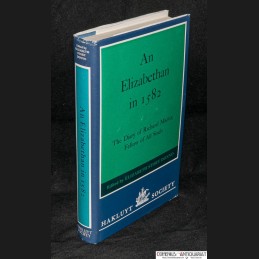Donno, Elizabeth Story [ed.],
An Elizabethan in 1582. The Diary of Richard Madox, Fellow of All Souls. London: Hakluyt Society, 1976. xvi, 365 Seiten mit Abbildungen auf Tafeln und Register. Leinen mit Schutzumschlag.
* Hakluyt Society c/o The British Library. Second Series No. 147
Bestell-Nr.155168 | ISBN: 0-904180-04-2
Donno |
Tagebuch |
Tagebuecher |
Richard Madox |
Neuere Geschichte |
Sechzehntes Jahrhundert |
Reisen |
Expeditionen |
Abenteurer
https://comenius-antiquariat.ch/buch/155168.html Chronicling, in the main, the initial (albeit abortive) attempt to establish a spice trade in the Moluccas, the Diary of Richard Madox, Fellow of All Souls, covers a single calendar year. Since five months of that year were to pass before the flotilla of four ships rounded the Lizard, the Diary also records its authors' winding up of his affairs at Oxford, his stay in London following upon the problems and false starts incident to departure, and the slow passage from Blackwall to Southampton aboard the Edward Bonaventure with the many visits to and from persons interested in the enterprise. The last seven months record the tensions and rivalries that developed in the command, the long sojourn at Sierra Leone, and an account of the subsequent passage to São Vicente, Brazil, where they were to encounter three Spanish ships and, in the words of Madox's fellow chaplain, have 'one verye hot breakfaste fyghtinge.'
As a circumstantial document, the Diary provides diverse information, ranging from details of the Oxford and London scenes and the organizational aspects of the trading venture to the customs of the natives of Sierra Leone, including the earliest English record of an African language, together with drawings of the flora and fauna. As a personal document it includes mordant comments on many individuals, particularly those participants in the venture who wished to turn to piracy. From mid-September on when Richard Madox became persona non grata to his 'captaine-General', they are concealed by cipher and pseudonyms but they are made intelligible through the clues he supplies - marginalia, cross-referencing, and an index to incriminating passages. Inhibited from keeping the official record of the voyage as members of the Privy Council had appointed him to do, Madox seems to have used this portion of his diary as a substitute for it.
Appendices include both his official record though it is extant only up to 21 July and the complementary diary of his fellow chaplain John Walker. Taken in conjunction with materials already printed, these several texts complete the documenting of the first attempt on the part of the English to establish a spice trade, an attempt that antedated the chartering of the East India Company by nearly 20 years






 Privacy
Privacy
 Shipping Costs
Shipping Costs
 Google Mail
Google Mail
